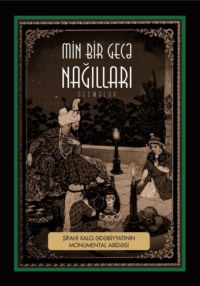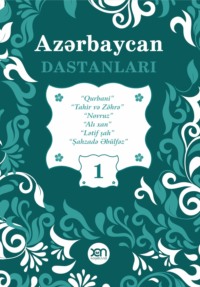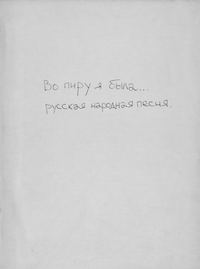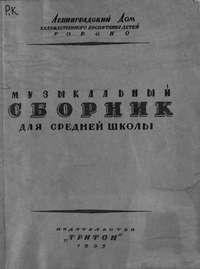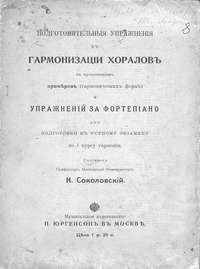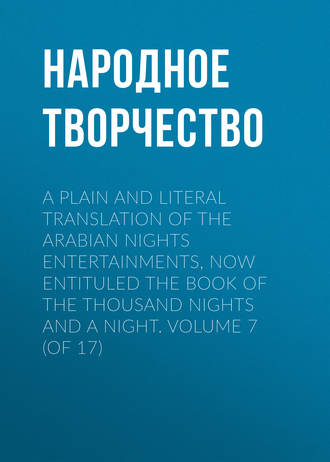 полная версия
полная версияA plain and literal translation of the Arabian nights entertainments, now entituled The Book of the Thousand Nights and a Night. Volume 7 (of 17)
Then she sobbed a single sob and gave up the ghost. We dug one grave for them and laid them in the earth, and I returned to the dwellings of my people, where I abode seven years. Then I betook me again to Al-Hijaz and entering Al-Medinah the Illumined for pious visitation said in my mind, “By Allah, I will go again to Otbah’s tomb!” So I repaired thither, and, behold, over the grave was a tall tree, on which hung fillets of red and green and yellow stuffs.93 So I asked the people of the place, “How be this tree called?”; and they answered, “The tree of the Bride and the Bridegroom.” I abode by the tomb a day and a night, then went my way; and this is all I know of Otbah. Almighty Allah have mercy upon him! And they also tell this tale of
HIND DAUGHTER OF AL-NU’MAN AND AL-HAJJAJ. 94
It is related that Hind daughter of Al-Nu’man was the fairest woman of her day, and her beauty and loveliness were reported to Al-Hajjaj, who sought her in marriage and lavished much treasure on her. So he took her to wife, engaging to give her a dowry of two hundred thousand dirhams in case of divorce, and when he went into her, he abode with her a long time. One day after this, he went in to her and found her looking at her face in the mirror and saying:—
Hind is an Arab filly purest bred,Which hath been covered by a mongrel mule;An colt of horse she throw by Allah! well;If mule, it but results from mulish rule.95When Al-Hajjaj heard this, he turned back and went his way, unseen of Hind; and, being minded to put her away, he sent Abdullah bin Táhir to her, to divorce her. So Abdullah went in to her and said to her, “Al-Hajjaj Abu Mohammed saith to thee: Here be the two hundred thousand dirhams of thy contingent dowry he oweth thee; and he hath deputed me to divorce thee.” Replied she, “O Ibn Tahir, I gladly agree to this; for know that I never for one day took pleasure in him; so, if we separate, by Allah, I shall never regret him, and these two hundred thousand dirhams I give to thee as a reward for the glad tidings thou bringest me of my release from yonder dog of the Thakafites.”96 After this, the Commander of the Faithful, Abd al-Malik bin Marwán, heard of her beauty and loveliness, her stature and symmetry, her sweet speech and the amorous grace of her glances and sent to her, to ask her in marriage;–And Shahrazad perceived the dawn of day and ceased to say her permitted say.
Now when it was the Six Hundred and Eighty-second Night,She resumed, It hath reached me, O auspicious King, that the Prince of True Believers, Abd al-Malik bin Marwan, hearing of the lady’s beauty and loveliness, sent to ask her in marriage; and she wrote him in reply a letter, in which, after the glorification of Allah and benediction of His Prophet, she said, “But afterwards. Know, O Commander of the Faithful, that the dog hath lapped in the vase.” When the Caliph read her answer, he laughed and wrote to her, citing his saying (whom may Allah bless and keep!) “If a dog lap in the vessel of one of you, let him wash seven times, once thereof with earth,” and adding, “Wash the affront from the place of use.”97 With this she could not gainsay him; so she replied to him, saying (after praise and blessing), “O Commander of the Faithful I will not consent save on one condition, and if thou ask me what it is, I reply that Al-Hajjaj lead my camel to the town where thou tarriest barefoot and clad as he is.”98 When the Caliph read her letter, he laughed long and loudly and sent to Al-Hajjaj, bidding him do as she wished. He dared not disobey the order, so he submitted to the Caliph’s commandment and sent to Hind, telling her to make ready for the journey. So she made ready and mounted her litter, when Al-Hajjaj with his suite came up to Hind’s door and as she mounted and her damsels and eunuchs rode around her, he dismounted and took the halter of her camel and led it along, barefooted, whilst she and her damsels and tirewomen laughed and jeered at him and made mock of him. Then she said to her tirewoman, “Draw back the curtain of the litter;” and she drew back the curtain, till Hind was face to face with Al-Hajjaj, whereupon she laughed at him and he improvised this couplet:—
Though now thou jeer, O Hind, how many a nightI’ve left thee wakeful sighing for the light.And she answered him with these two:—
We reck not, an our life escape from bane,For waste of wealth and gear that went in vain:Money may be regained and rank re-wonWhen one is cured of malady and pain.And she ceased not to laugh at him and make sport of him, till they drew near the city of the Caliph, when she threw down a dinar with her own hand and said to Al-Hajjaj, “O camel-driver, I have dropped a dirham; look for it and give it to me.” So he looked and seeing naught but the dinar, said, “This is a dinar.” She replied, “Nay, ’tis a dirham.” But he said, “This is a dinar.” Then quoth she, “Praised be Allah who hath given us in exchange for a paltry dirham a dinar! Give it us.” And Al-Hajjaj was abashed at this. Then he carried her to the palace of the Commander of the Faithful, and she went in to him and became his favourite.–And Shahrazad perceived the dawn of day and ceased saying her permitted say.
Now when it was the Six Hundred and Eighty-third Night,She pursued, It hath reached me, O auspicious King, that men also tell a tale anent
KHUZAYMAH BIN BISHR AND IKRIMAH AL-FAYYAZ. 99
There lived once, in the days of the Caliph Sulayman bin Abd al-Malik100 a man of the Banu Asad, by name Khuzaymah bin Bishr, who was famed for bounty and abundant wealth and excellence and righteous dealing with his brethren. He continued thus till times grew strait with him and he became in need of the aid of those Moslem brethren on whom he had lavished favour and kindness. So they succoured him a while and then grew weary of him, which when he saw, he went in to his wife who was the daughter of his father’s brother, and said to her, “O my cousin, I find a change in my brethren; wherefore I am resolved to keep my house till death come to me.” So he shut his door and abode in his home, living on that which he had by him, till it was spent and he knew not what to do. Now Ikrimah al-Raba’í, surnamed Al-Fayyáz, governor of Mesopotamia,101 had known him, and one day, as he sat in his audience-chamber, mention was made of Khuzaymah, whereupon quoth Ikrimah, “How is it with him?” And quoth they, “He is in a plight past telling, and hath shut his door and keepeth the house.” Ikrimah rejoined, “This cometh but of his excessive generosity: but how is it that Khuzaymah bin Bishr findeth nor comforter nor requiter?” And they replied, “He hath found naught of this.” So when it was night, Ikrimah took four thousand dinars and laid them in one purse; then, bidding saddle his beast, he mounted and rode privily to Khuzaymah’s house, attended only by one of his pages, carrying the money. When he came to the door, he alighted and taking the purse from the page made him withdraw afar off; after which he went up to the door and knocked. Khuzaymah came out to him, and he gave him the purse, saying, “Better thy case herewith.” He took it and finding it heavy put it from his hand and laying hold of the bridle of Ikrimah’s horse, asked, “Who art thou? My soul be thy ransom!” Answered Ikrimah, “O man I come not to thee at a time like this desiring that thou shouldst know me.” Khuzaymah rejoined, “I will not let thee go till thou make thyself known to me,” whereupon Ikrimah said “I am hight Jábir Atharát al-Kirám.”102 Quoth Khuzaymah, “Tell me more.” But Ikrimah cried, “No,” and fared forth, whilst Khuzaymah went in to his cousin and said to her, “Rejoice for Allah hath sent us speedy relief and wealth; if these be but dirhams, yet are they many. Arise and light the lamp.” She said, “I have not wherewithal to light it.” So he spent the night handling the coins and felt by their roughness that they were dinars, but could not credit it. Meanwhile Ikrimah returned to his own house and found that his wife had missed him and asked for him, and when they told her of his riding forth, she misdoubted of him, and said to him, “Verily the Wali of Al-Jazirah rideth not abroad after such an hour of the night, unattended and secretly, save to a wife or a mistress.” He answered, “Allah knoweth that I went not forth to either of these.” “Tell me then wherefore thou wentest forth?” “I went not forth at this hour save that none should know it.” “I must needs be told.” “Wilt thou keep the matter secret, if I tell thee?” “Yes!” So he told her the state of the case, adding, “Wilt thou have me swear to thee?” Answered she, “No, no, my heart is set at ease and trusteth in that which thou hast told me.” As for Khuzaymah, soon as it was day he made his peace with his creditors and set his affairs in order; after which he got him ready and set out for the Court of Sulayman bin Abd al-Malik, who was then sojourning in Palestine.103 When he came to the royal gate, he sought admission of the chamberlain, who went in and told the Caliph of his presence. Now he was renowned for his beneficence and Sulayman knew of him; so he bade admit him. When he entered, he saluted the Caliph after the usual fashion of saluting104 and the King asked, “O Khuzaymah, what hath kept thee so long from us?” Answered he, “Evil case,” and quoth the Caliph, “What hindered thee from having recourse to us?” Quoth he, “My infirmity, O Commander of the Faithful!” “And why,” said Sulayman, “comest thou to us now?” Khuzaymah replied, “Know, O Commander of the Faithful, that I was sitting one night late in my house, when a man knocked at the door and did thus and thus;” and he went on to tell him of all that had passed between Ikrimah and himself from first to last. Sulayman asked, “Knowest thou the man?” and Khuzaymah answered, “No, O Commander of the Faithful, he was reserved105 and would say naught save:—I am hight Jabir Atharat al-Kiram.” When Sulayman heard this, his heart burned within him for anxiety to discover the man, and he said, “If we knew him, truly we would requite him for his generosity.” Then he bound for Khuzaymah a banner106 and made him Governor of Mesopotamia, in the stead of Ikrimah al-Fayyaz; and he set out for Al-Jazirah. When he drew near the city, Ikrimah and the people of the place came forth to meet him and they saluted each other and went on into the town, where Khuzaymah took up his lodging in the Government-house and bade take security for Ikrimah and that he should be called to account.107 So an account was taken against him and he was found to be in default for much money; whereupon Khuzaymah required of him payment, but he said, “I have no means of paying aught.” Quoth Khuzaymah, “It must be paid;” and quoth Ikrimah, “I have it not; do what thou hast to do.” So Khuzaymah ordered him to gaol.–And Shahrazad perceived the dawn of day and ceased to say her permitted say.
Now when it was the Six Hundred and Eighty-fourth Night,She said, It hath reached me, O auspicious King, that Khuzaymah, having ordered the imprisonment of Ikrimah al-Fayyaz, sent to him again to demand payment of the debt; but he replied, “I am not of those who preserve their wealth at the expense of their honour; do what thou wilt.” Then Khuzaymah bade load him with irons and kept him in prison a month or more, till confinement began to tell upon him and he became wasted. After this, tidings of his plight travelled to the daughter of his uncle who was troubled with sore concern thereat and, sending for a freedwoman of hers, a woman of abundant judgment, and experience, said to her, “Go forthwith to the Emir Khuzaymah’s gate and say:—I have a counsel for the Emir. If they ask what it is, add:—I will not tell it save to himself; and when thou enterest to him, beg to see him in private and when private ask him:—What be this deed thou hast done? Hath Jabir Atharat al-Kiram deserved of thee no better reward than to be cast into strait prison and hard bond of irons?” The woman did as she was bid, and when Khuzaymah heard her words, he cried out at the top of his voice, saying, “Alas, the baseness of it! Was it indeed he?” And she answered, “Yes.” Then he bade saddle his beast forthwith and, summoning the honourable men of the city, repaired with them to the prison and opening the door, went in with them to Ikrimah, whom they found sitting in evil case, worn out and wasted with blows and misery. When he looked at Khuzaymah, he was abashed and hung his head; but the other bent down to him and kissed his face; whereupon he raised his head and asked, “What maketh thee do this?” Answered Khuzaymah, “The generosity of thy dealing and the vileness of my requital.” And Ikrimah said, “Allah pardon us and thee!” Then Khuzaymah commanded the jailor to strike off Ikrimah’s fetters and clap them on his own feet; but Ikrimah said, “What is this thou wilt do?” Quoth the other, “I have a mind to suffer what thou hast suffered.” Quoth Ikrimah, “I conjure thee by Allah, do not so!” Then they went out together and returned to Khuzaymah’s house, where Ikrimah would have farewelled him and wended his way; but he forbade him and Ikrimah said, “What is thy will of me?” Replied Khuzaymah, “I wish to change thy case, for my shame before the daughter of thine uncle is yet greater than my shame before thee.” So he bade clear the bath and entering with Ikrimah, served him there in person and when they went forth he bestowed on him a splendid robe of honour and mounted him and gave him much money. Then he carried him to his house and asked his leave to make his excuses to his wife and obtained her pardon. After this he besought him to accompany him to the Caliph, who was then abiding at Ramlah108 and he agreed. So they journeyed thither, and when they reached the royal quarters the chamberlain went in and acquainted the Caliph Sulayman bin Abd al-Malik with Khuzaymah’s arrival, whereat he was troubled and said, “What! is the Governor of Mesopotamia come without our command? This can be only on some grave occasion.” Then he bade admit him and said, before saluting him, “What is behind thee, O Khuzaymah?” Replied he, “Good, O Commander of the Faithful.” Asked Sulayman, “What bringeth thee?”; and he answered, saying, “I have discovered Jabir Atharat al-Kiram and thought to gladden thee with him, knowing thine excessive desire to know him and thy longing to see him.” “Who is he?” quoth the Caliph and quoth Khuzaymah, “He is Ikrimah al-Fayyaz.” So Sulayman called for Ikrimah, who approached and saluted him as Caliph; and the King welcomed him and making him draw near his sitting-place, said to him, “O Ikrimah, thy good deed to him hath brought thee naught but evil,” adding, “Now write down in a note thy needs each and every, and that which thou desirest.” He did so and the Caliph commanded to do all that he required and that forthwith. Moreover he gave him ten thousand dinars more than he asked for and twenty chests of clothes over and above that he sought, and calling for a spear, bound him a banner and made him Governor over Armenia and Azarbiján109 and Mesopotamia, saying, “Khuzaymah’s case is in thy hands, an thou wilt, continue him in his office, and if thou wilt, degrade him.” And Ikrimah said, “Nay, but I restore him to his office, O Commander of the Faithful.” Then they went out from him and ceased not to be Governors under Sulayman bin Abd al-Malik all the days of his Caliphate. And they also tell a tale of
YUNUS THE SCRIBE AND THE CALIPH WALID BIN SAHL
There lived in the reign of the Caliph Hishám,110 son of Abd al-Malik, a man called Yúnus the Scribe well-known to the general, and he set out one day on a journey to Damascus, having with him a slave-girl of surpassing beauty and loveliness, whom he had taught all that was needful to her and whose price was an hundred thousand dirhams. When they drew near to Damascus, the caravan halted by the side of a lake and Yunus went down to a quiet place with his damsel and took out some victual he had with him and a leather bottle of wine. As he sat at meat, behold, came up a young man of goodly favour and dignified presence, mounted on a sorrel horse and followed by two eunuchs, and said to him, “Wilt thou accept me to guest?” “Yes,” replied Yunus. So the stranger alighted and said, “Give me to drink of thy wine.” Yunus gave him to drink and he said, “If it please thee, sing us a song.” So Yunus sang this couplet extempore:—
She joineth charms were never seen conjoined in mortal dress:And for her love she makes me love my tears and wakefulness.At which the stranger rejoiced with exceeding joy and Yunus gave him to drink again and again, till the wine got the better of him and he said, “Bid thy slave-girl sing.” So she improvised this couplet:—
A houri, by whose charms my heart is moved to sore distress:Nor wand of tree nor sun nor moon her rivals I confess!The stranger was overjoyed with this and they sat drinking till nightfall, when they prayed the evening-prayer and the youth said to Yunus, “What bringeth thee to our city?” He replied, “Quest of wherewithal to pay my debts and better my case.” Quoth the other, “Wilt thou sell me this slave-girl for thirty thousand dirhams?” Whereto quoth Yunus, “I must have more than that.” He asked, “Will forty thousand content thee?”; but Yunus answered, “That would only settle my debts, and I should remain empty-handed.” Rejoined the stranger, “We will take her of thee at fifty thousand dirhams111 and give thee a suit of clothes to boot and the expenses of thy journey and make thee a sharer in my condition as long as thou livest.” Cried Yunus, “I sell her to thee on these terms.” Then said the young man, “Wilt thou trust me to bring thee the money to-morrow and let me take her with me, or shall she abide with thee till I pay thee down her price?” Whereto wine and shame and awe of the stranger led Yunus to reply, “I will trust thee; take her and Allah bless thee in her!” Whereupon the visitor bade one of his pages sit her before him on his beast, and mounting his own horse, farewelled of Yunus and rode away out of sight. Hardly had he left him, when the seller bethought himself and knew that he had erred in selling her and said to himself, “What have I done? I have delivered my slave-girl to a man with whom I am unacquainted, neither know I who he is; and grant that I were acquainted with him, how am I to get at him?” So he abode in thought till the morning, when he prayed the dawn-prayers and his companions entered Damascus, whilst he sat, perplexed and wotting not what to do, till the sun scorched him and it irked him to abide there. He thought to enter the city, but said in his mind, “If I enter Damascus, I cannot be sure but that the messenger will come and find me not, in which case I shall have sinned against myself a second sin.” Accordingly he sat down in the shade of a wall that was there, and towards the wane of day, up came one of the eunuchs whom he had seen with the young man, whereat great joy possessed Yunus and he said in himself, “I know not that aught hath ever given me more delight than the sight of this castrato.” When the eunuch reached him, he said to him, “O my lord, we have kept thee long waiting”; but Yunus disclosed nothing to him of the torments of anxiety he had suffered. Then quoth the castrato, “Knowest thou the man who bought the girl of thee?”; and quoth Yunus, “No,” to which the other rejoined, “’Twas Walid bin Sahl,112 the Heir Apparent.” And Yunus was silent. Then said the eunuch, “Ride,” and made him mount a horse he had with him and they rode till they came to a mansion, where they dismounted and entered. Here Yunus found the damsel, who sprang up at his sight and saluted him. He asked her how she had fared with him who had bought her and she answered, “He lodged me in this apartment and ordered me all I needed.” Then he sat with her awhile, till suddenly one of the servants of the house-owner came in and bade him rise and follow him. So he followed the man into the presence of his master and found him yesternight’s guest, whom he saw seated on his couch and who said to him, “Who art thou?” “I am Yunus the Scribe.” “Welcome to thee, O Yunus! by Allah, I have long wished to look on thee; for I have heard of thy report. How didst thou pass the night?” “Well, may Almighty Allah advance thee.” “Peradventure thou repentedest thee of that thou didst yesterday and saidst to thyself: I have delivered my slave-girl to a man with whom I am not acquainted, neither know I his name nor whence he cometh?” “Allah forbid, O Emir, that I should repent over her! Had I made gift of her to the Prince, she were the least of the gifts that are given unto him,”–And Shahrazad perceived the dawn of day and ceased saying her permitted say.
Now when it was the Six Hundred and Eighty-fifth Night,She continued, It hath reached me, O auspicious King, that when Yunus the Scribe said to Walid, “Allah forbid I should repent over her! Had I made gift of her to the Prince, she were the least of gifts that are given to him, nor indeed is she worthy of his rank,” Walid rejoined, “By Allah, but I repented me of having carried her away from thee and said to myself:—This man is a stranger and knoweth me not, and I have taken him by surprise and acted inconsiderately by him, in my haste to take the damsel! Dost thou recall what passed between us?” Quoth Yunus, “Yes!” and quoth Walid, “Dost thou sell this damsel to me for fifty thousand dirhams?” And Yunus said, “I do.” Then the Prince called to one of his servants to bring him fifty thousand dirhams and a thousand and five hundred dinars to boot, and gave them all to Yunus, saying, “Take the slave’s price: the thousand dinars are for thy fair opinion of us and the five hundred are for thy viaticum and for what present thou shalt buy for thy people. Art thou content?” “I am content,” answered Yunus and kissed his hands, saying, “By Allah, thou hast filled my eyes and my hands and my heart!” Quoth Walid, “By Allah, I have as yet had no privacy of her nor have I taken my fill of her singing. Bring her to me!” So she came and he bade her sit, then said to her, “Sing.” And she sang these verses:—
O thou who dost comprise all Beauty’s boons!O sweet of nature, fain of coquetry!In Turks and Arabs many beauties dwell;But, O my fawn, in none thy charms I see.Turn to thy lover, O my fair, and keepThy word, though but in visioned phantasy:Shame and disgrace are lawful for thy sakeAnd wakeful nights full fill with joy and glee:I’m not the first for thee who fared distraught;Slain by thy love how many a many be!I am content with thee for worldly shareDearer than life and good art thou to me!When he heard this, he was delighted exceedingly and praised Yunus for his excellent teaching of her and her fair education. Then he bade his servants bring him a roadster with saddle and housings for his riding, and a mule to carry his gear, and said to him, “O Yunus, when it shall reach thee that command hath come to me, do thou join me; and, by Allah, I will fill thy hands with good and advance thee to honour and make thee rich as long as thou livest!” So Yunus said, “I took his goods and went my ways; and when Walid succeeded to the Caliphate, I repaired to him; and by Allah, he kept his promise and entreated me with high honour and munificence. Then I abode with him in all content of case and rise of rank and mine affairs prospered and my wealth increased and goods and farms became mine, such as sufficed me and will suffice my heirs after me; nor did I cease to abide with Walid, till he was slain, the mercy of Almighty Allah be on him!” And men tell a tale concerning
HARUN AL-RASHID AND THE ARAB GIRL
The Caliph Harun al-Rashid was walking one day with Ja’afar the Barmecide, when he espied a company of girls drawing water and went up to them, having a mind to drink. As he drew near, one of them turned to her fellows and improvised these lines:—
Thy phantom bid thou fleet, and flyFar from the couch whereon I lie;So I may rest and quench the fire,Bonfire in bones aye flaming high;My love-sick form Love’s restless palmRolls o’er the rug whereon I sigh:How ’tis with me thou wottest wellHow long, then, union wilt deny?The Caliph marvelled at her elegance and eloquence.–And Shahrazad perceived the dawn of day and ceased to say her permitted say.
Now when it was the Six Hundred and Eighty-sixth Night,She resumed, It hath reached me, O auspicious King, that the Caliph, hearing the girl’s verses, marvelled at her elegance and eloquence, and said to her, “O daughter of nobles, are these thine own or a quotation?” Replied she, “They are my very own,” and he rejoined, “An thou say sooth keep the sense and change the rhyme.” So she said:—


